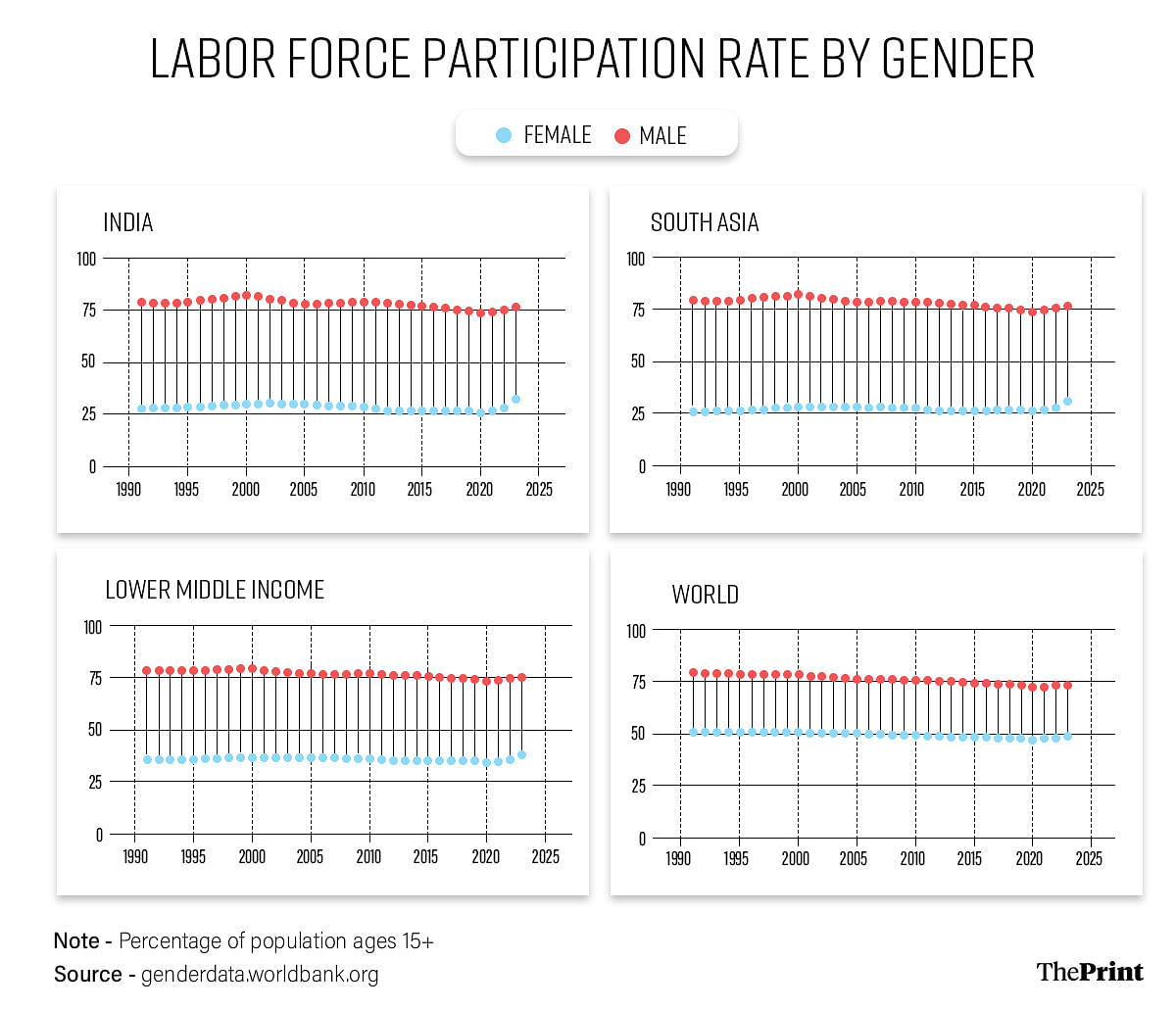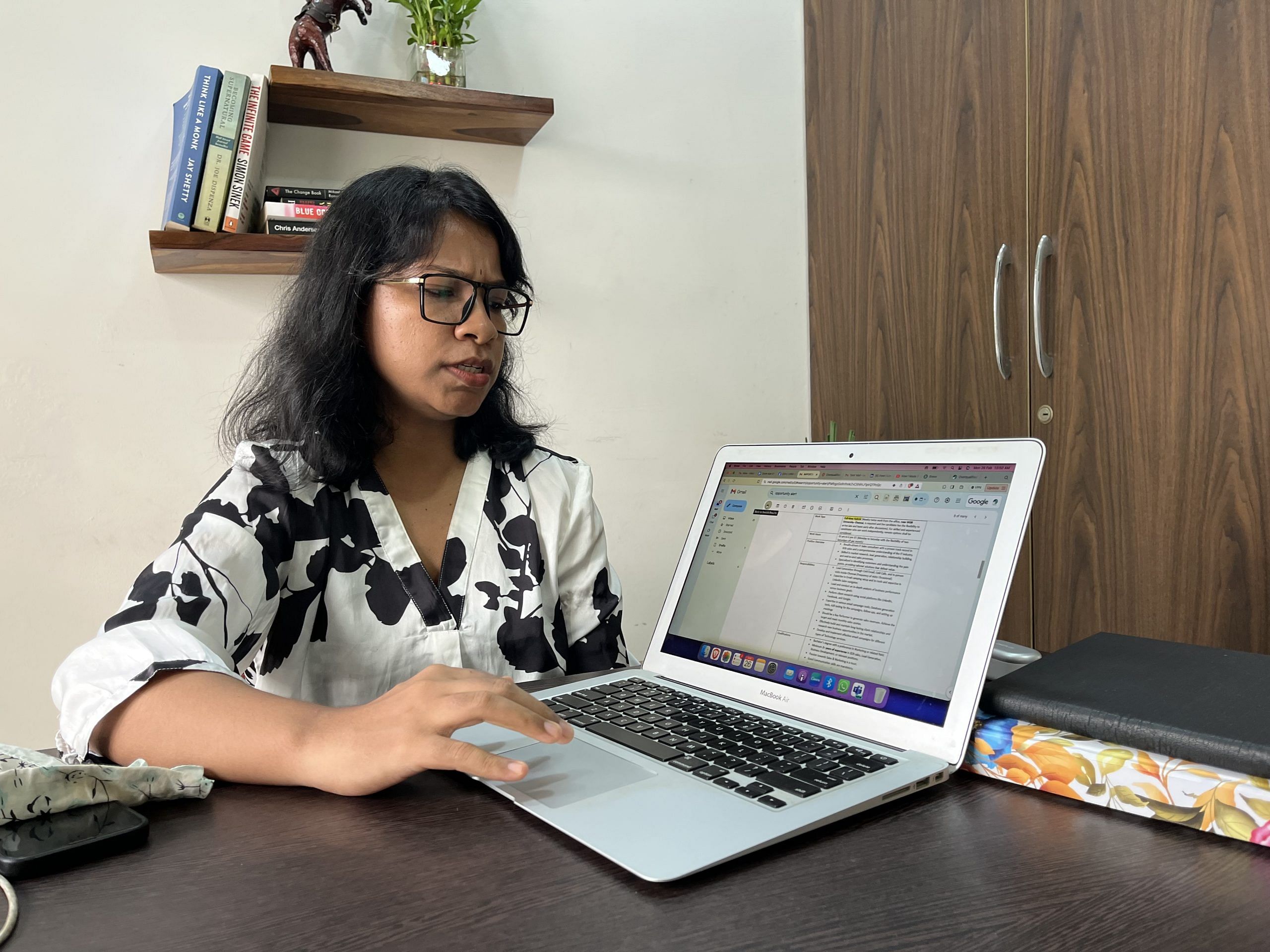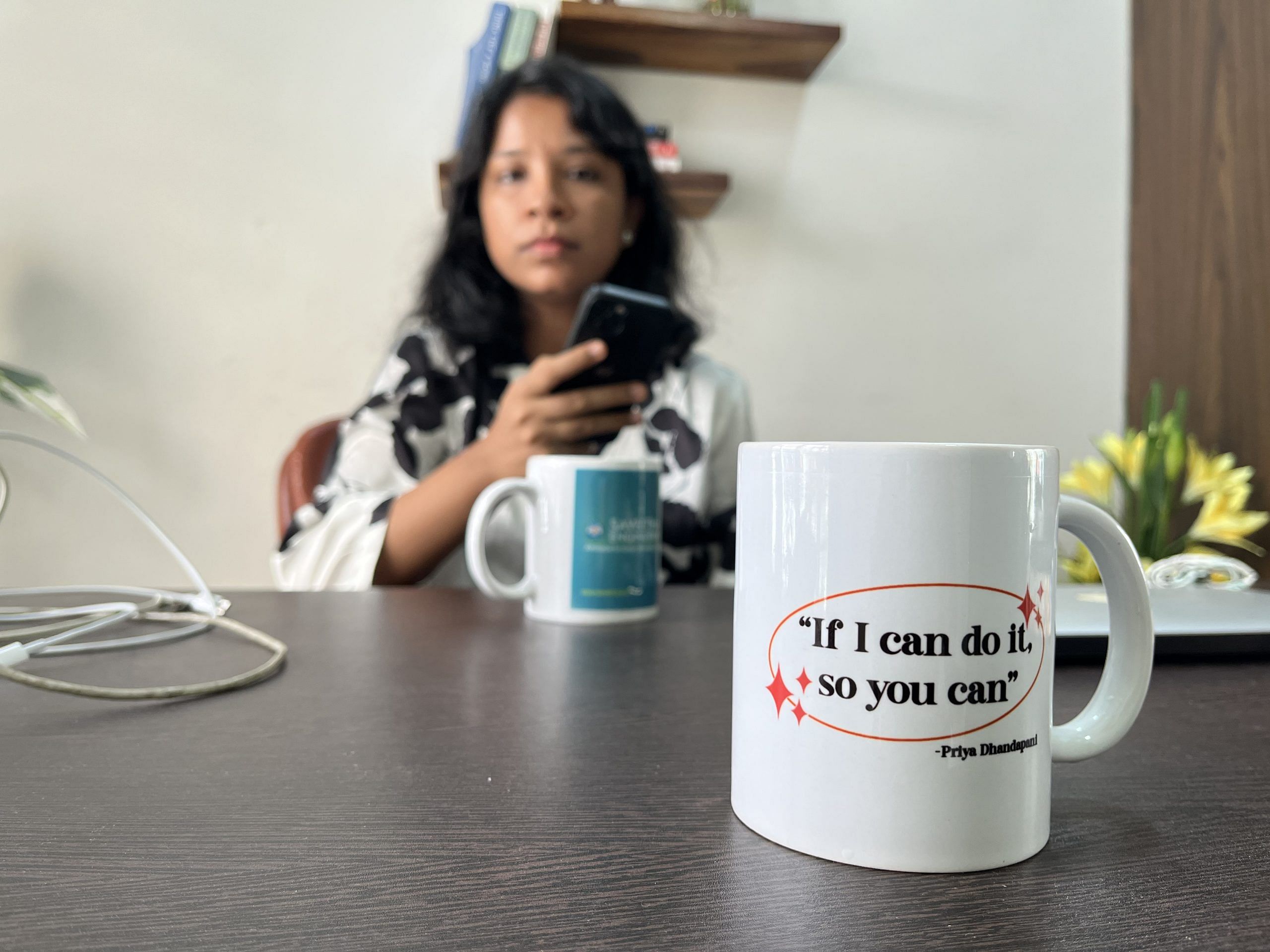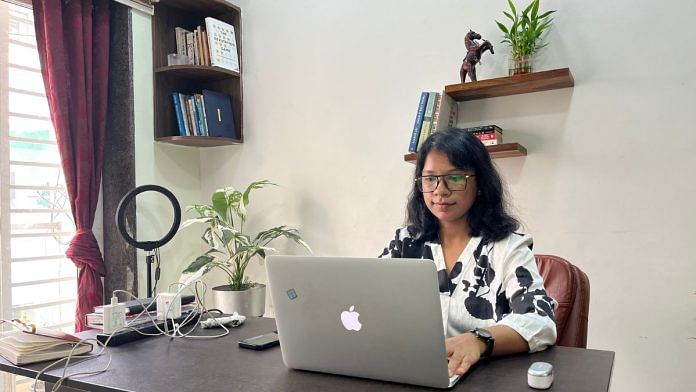Chennai: After working in the IT sector for eight years, Sankari took a career break to take care of her baby. But a little over a year later, when she was ready to return to the workforce, there was no place for her. She was passed over as just another ‘housewife’.
“I am an MIT [Madras Institute of Technology] graduate in computer science engineering, and I was getting job offers for data entry. I was at the peak of my career in the IT sector before conceiving my baby. Why would I settle for less?” said the 30-year-old, outrage and anger seeping into her otherwise soft-spoken demeanour.
Unwilling to accept the penalty of motherhood, Sankari tapped into her network, used her IT skills, and launched her own job portal, Overqualified Housewives. That was in August 2021. Since then, she has hired five employees, upskilled more than 2,500 women, and helped more than 500 women get jobs in the IT, healthcare and other sectors. Work from home, freelance gigs, and one-time payments are prioritised on her portal, “which promises to act as a catalyst in giving women their power back”.
But Sankari is fighting prejudice at every level. Women who have children are disadvantaged when it comes to recruitment, salaries, and perceived competence. It even has its own term—the ‘motherhood penalty’. According to the US-based National Bureau of Economic Research, on average, a quarter of women in the world will drop out of the workforce within a year of the birth of their first child as a result of the motherhood penalty.
Gendered social norms restrict women’s role in the labour market. If female employment remains at this level, India will have fewer people in paid work even 20 years from now—Vidya Mahambare, economist and professor at Great Lakes Institute of Management
And in India, the pressure to conform begins at home.
“Gendered social norms that encourage men to be the primary providers of family finances and women to focus on childcare and household duties restrict women’s role in the labour market,” said economist Vidya Mahambare, professor of economics and director (research) at Great Lakes Institute of Management, Chennai, who estimates that only 28 per cent of women in urban India were employed in 2022-23. The gender disparity is stark. According to Mahambare, around 96 per cent of Indian men in the prime age-group of 25-54 years were employed in 2022-23, but it was only around 37 per cent for women.

According to a 2022 World Bank Global Study, only 24 per cent of women over 15 are working in India.
“If female employment remains at this level, despite having the world’s largest working-age population, India will have fewer people in paid work even twenty years from now,” she added.
Sankari had a ‘eureka’ moment one morning while reading a newspaper report that said India has the largest number of overqualified housewives. And that’s what she decided to do: Help women return to the workforce.
There’s no dearth of policies in India that benefit women after childbirth. Women get paid maternity leave for six months after a 2017 amendment to the Maternity Benefit Act, which also covers work-from-home or hybrid work models. But Sankari says change has to begin at home.
“This is not [just] about policy change but also a change of environment in our house too.” Her family supported her decision to restart her career, but even then people would ask her, ‘Why now? Why can’t you wait?’
“They couldn’t understand that opportunity doesn’t wait.”

Companies make it difficult
As frustrating as Sankari’s job search was, she realised that she wasn’t alone in paying the motherhood penalty.
“I tried connecting with other women who were brilliant in academics and their jobs. But after motherhood, they were sitting at home. I was shocked, so I decided to create a platform that provides jobs,” said Sankari, whose son is now three years old.
All the women she reached out to had similar experiences, a reflection of ingrained prejudice in the corporate world. On paper, HR policies are not discriminatory against women, and companies extol the benefits they provide.
I tried connecting with other women who were brilliant in academics and their jobs. But after motherhood, they were sitting at home. I was shocked, so I decided to create a platform that provides jobs—Sankari, who runs the startup ‘Overqualified Housewives’
“It is true that when women become mothers, they take a break in their career, but these days most companies have policies. The government has also made strict rules about maternity leaves. I won’t say women are behind when they join back. Motherhood makes them stronger, not weak,” said an HR manager of a company on the condition of anonymity.
“We receive leave requests because of the child and family but this situation comes with everyone.”
But many companies do not follow the rules, and the odds are stacked against women even before they get pregnant. A study in the UK concluded that nearly one in five HR managers are reluctant to hire women who may start families.
According to the Maternity Benefit Act 2017, companies with more than 50 employees should provide day-care facilities, but this has not been widely put into practice.
“If a mother wants to start working again then the first thing she needs is support from their family, many women don’t get it, and even if they get it can’t find jobs because the companies don’t provide enough support to mothers,” said Sankari.
On LinkedIn, women talk about the lack of flexibility, daycare centres, and long working hours.
I have a supportive husband. I thought it would be fine for me but even after six months I was not able to leave my baby and that’s when I took a break from work
Before she became pregnant, Sankari saw a friend employed by an MNC struggle after becoming a mother. She used to think that she would never experience this. But when she became a mother, she realised there was no escaping the ‘penalty’.
“I have a supportive husband. I thought it would be fine for me but even after six months I was not able to leave my baby and that’s when I took a break from work,” said Sankari.
Taking a break from work didn’t help as she struggled with an identity crisis. She stopped using social media because whenever she opened Instagram, people were getting promotions, new jobs, and moving on with their lives. But Sankari felt stuck.
“Motherhood is an amazing thing, but it is the mother who has to compromise on everything in this process. Her life, her dreams, everything stops. After giving birth to my child I felt lost. I felt I had an identity crisis as if it was a penalty I was paying for motherhood,” said Sankari.

Simple Idea, big change
In the initial months, Sankari considered—and rejected—many ideas to restart her career.
“I wanted to do something meaningful. I was depressed being at home.” She had a ‘eureka’ moment one morning while reading a newspaper report that said India has the largest number of overqualified housewives. And that’s what she decided to do: Help women return to the workforce.
She deliberately chose the word ‘housewives’ and argued against those who criticised her saying it was demeaning. House maker, house manager, home economist were some of the suggestions, but she did not budge on this.
“When I decided to go with this name, some people took offence. But ‘housewife’ [signals] a clear message to people, and it is working for me,” said Sankari, opening the website on her laptop at her home-office in Natesan Nagar, in Chennai.
We found Overqualified Housewives online. We were looking for committed and responsible people who could work for us. We did campus visits and the placements also but this worked well for us—Siva Kumar, chief of staff, The Social Company
People soon started recognising her as the lady who is helping other women. Her neighbours started reading about her in local newspapers and magazines, and watching video interviews in Tamil. She was featured in Tamil publications like Dina Thanathi magazine (‘Providing self respect for women’) and Josh Talks (‘Listen to Sankari’), and Doordarshan. She shared the stage with leaders like Shashi Tharoor to discuss action steps and policies needed to bridge the gap between education and employability among graduate women of India, was named one of Google’s Women Techmakers Ambassadors, and often gets invited to give talks in colleges.
But even here, she finds herself being shushed.
Recently, she went to a college to talk about working women and shared how it is difficult to continue working after childbirth. But then she faced moral policing from an HoD.
“She told me that this is the problem with young women, ‘I have been working for 30 years and managed everything’ She didn’t understand that times have changed and in nuclear families, it requires a lot to manage everything. But I couldn’t say anything to her,” said Sankari.
WFH a boon—but not entirely
Today, Sankari says she has tied up with 600 businesses in cities like Chennai and Bengaluru and even in the US and Germany. When she started out, she began with finding HR, admin and data entry jobs. “But now we have expanded to 25 options that include IT, content writing, real estate and hospitality, among others,” said Sankari, who launched her business with no outside investment.
Most of the women she’s placed earn a monthly salary in the range of Rs. 18,000 to 60,000 depending on skill level and position. “We take 8.33 percent of the annual package amount as our commission from the businesses, not from the candidates,” said Sankari.
Now, she wants to expand the scope of Overqualified Housewives to help more women from lower middle-class families.
“The upper middle class can afford to hire house help so they work from home. The middle and lower-middle class suffer the most. In most cases, they survive on one income,” says Sankari, quickly scanning the messages on her phone and email from her home office—a functional room in her 3BHK apartment.
For women, work-from-home can add to stress and burnout because they continuously juggle the two roles. Also, WFH denies women the opportunity to expand their social network and support system, one of the main long-term benefits of being employed in paid work—Prof Mahambare
Everyone works from home including her team of five employees—women who were selected from Overqualified Housewives. But Prof Mahambare cautions against the WFH model, especially for working mothers.
“For women, WFH can add to stress and burnout because they continuously juggle the two roles. Also, WFH denies women the opportunity to expand their social network and support system, one of the main long-term benefits of being employed in paid work,” she said.
Sankari’s website has an easy interface and a simple message: ‘Putting women back in the work from home force’. There are two entry points—one for candidates searching for jobs and another for businesses looking to hire people. Sankari makes it clear to recruiters that it comes down to flexible work solutions.
“We found Overqualified Housewives online. We were looking for committed and responsible people who could work for us. We did campus visits and the placements also but this worked well for us,” said Siva Kumar, chief of staff at The Social Company. The Chennai-based personal branding agency has hired six women from Overqualified Housewives for jobs such as brand executive, content lead, and operations lead.
“It is a win-win situation for both. They are here for the long term, they are not running from one place to another. They complete the assignments. We have a tracking system that shows what they are doing. We are happy to have them in our team,” added Kumar.
Every potential candidate who signs up with Overqualified Housewife is screened first by Sankari and her team before interviews with potential employers are scheduled. Women can only sign up for career counselling and up-skilling seminars on content writing, social media, design and SEO for around Rs 199 per session.
I maximise my productivity during these quiet times. Motherhood has taught me the true value of time, and while I may have regretted wasting it before, now every moment is precious to me—Pavithra Periswamy, 30, a master in genetics
Won’t be settling for less
Many of the women that the University of Periyar has placed don’t have nannies, cooks or chauffeurs. They have to manage it all—work, child care and the home. They have to work extra hard to simply be accepted back into the workforce.
“I’ve often found myself feeding and putting my baby to sleep, while attending meetings with C-suite executives without compromising either responsibility,” 30-year-old Pavithra Periswamy, who has a master’s in genetics and worked as a clinical research coordinator for a Bengaluru start-up in the beginning of her career. She also six years of experience in content writing.
“If you are a woman with dreams, you needn’t have to settle for less than you deserve. We always have to strive for excellence, even if it means facing challenges and giving up our comfort.”
Motherhood gave Periswamy a different perspective on life and she decided she wanted to get back into writing. “I took a digital marketing course when my baby was three months old,” said Periswamy, who now works as a freelance content writer after signing up with Overqualified Housewives.
Her work schedule revolves around her baby’s sleeping pattern, either early mornings or late nights. “I maximise my productivity during these quiet times. Motherhood has taught me the true value of time, and while I may have regretted wasting it before, now every moment is precious to me,” said Periswamy who splits the child caring responsibility with her husband.
For data analyst Gayathri Neppolean, trying to get back on the career track was as overwhelming as motherhood. Even as a child, Gayathri had dreams. After graduating from the University of Periyar and getting a Masters from the University of Madras, she landed a job as a data analyst. “It was a contractual job, but it was enough to make me feel confident and independent,” she said.
With her career on track, she got married in February 2021 and became pregnant in October. “Finding out that I was going to be a mother was one of the happiest moments of my life,” she said. But she lost her job and put her career on hold. “The agency was not ready to give me work from home and I wasn’t able to leave my child alone at home.”
As Gayathri navigated the bittersweet experience of motherhood, she tried to reconcile it with her need for financial independence. “Since childhood I have dreamt about becoming an independent girl. I studied well for that. But after becoming a mother I felt I was paying some fine,” she said. “I didn’t like asking for money from my husband. I kept searching for a job and that’s when I found Overqualified Housewives,” said Gayathri, who works as a freelance writer.
Like any good businesswoman, Sankari is mapping out her expansion plans. More women, more jobs, more speed — just like her WhatsApp’s voice note speed. She occasionally takes a break from work to be with her son and supervise the house work, but she wants to increase her output. She wants to help one lakh women, not 500.
“We are also focusing on upskilling women. The market keeps growing and they have to match the speed,” said Sankari.
Her voice note speed on WhatsApp is 2x.
(Edited by Prashant)



